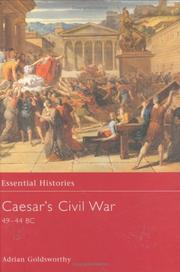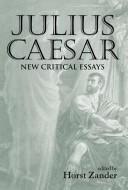| Listing 1 - 10 of 11 | << page >> |
Sort by
|

ISBN: 0300191197 9780300191196 0300108095 9780300108095 Year: 2006 Publisher: New Haven
Abstract | Keywords | Export | Availability | Bookmark
 Loading...
Loading...Choose an application
- Reference Manager
- EndNote
- RefWorks (Direct export to RefWorks)
Assassins --- Conspiracies --- Caesar, Julius --- Caesar, Caius Julius --- César --- Cesare --- Caesar, Gaius Julius --- Caesar, Gaius Iulius --- Caesar, Caius Iulius --- Caesar, C. Iuluis --- Caesar, C. Julius --- Caesar, Cajus Julius --- Caesar, G. J. --- Cäsar, Julius --- Cèsar, G. Juli --- Cèsar, Gai Juli --- Cesar, Gayo Julio --- César, Jules --- César, Julio, --- Cesare, C. Iulio --- Cesare, C. Julio --- Cesare, Caio Giulio --- Cesare, Gaio Giulio --- Cesare, Giulio --- Cezar, Juliusz --- Gaius Julius Caesar --- I︠U︡liĭ T︠S︡ezarʹ --- Julius Caesar --- Julius Caesar, Gaius --- Juliusz Cezar --- Kʻai-sa --- Kaisa --- T︠S︡ezarʹ, I︠U︡liĭ --- צעזר, יוליוס --- קיסר, יוליוס --- יוליוס, קיסר --- Assassination --- Rome
Book
ISBN: 1283331799 9786613331793 0300178492 9780300178494 9780300152180 0300152183 Year: 2011 Publisher: New Haven, CT Yale University Press
Abstract | Keywords | Export | Availability | Bookmark
 Loading...
Loading...Choose an application
- Reference Manager
- EndNote
- RefWorks (Direct export to RefWorks)
Renaissance plays and poetry in England were saturated with the formal rhetorical twists that Latin education made familiar to audiences and readers. Yet a formally educated man like Ben Jonson was unable to make these ornaments come to life in his two classical Roman plays. Garry Wills, focusing his attention on Julius Caesar, here demonstrates how Shakespeare so wonderfully made these ancient devices vivid, giving his characters their own personal styles of Roman speech.In four chapters, devoted to four of the play's main characters, Wills shows how Caesar, Brutus, Antony, and Cassius each has his own take on the rhetorical ornaments that Elizabethans learned in school. Shakespeare also makes Rome present and animate by casting his troupe of experienced players to make their strengths shine through the historical facts that Plutarch supplied him with. The result is that the Rome English-speaking people carry about in their minds is the Rome that Shakespeare created for them. And that is even true, Wills affirms, for today's classical scholars with access to the original Roman sources.
Rhetoric, Renaissance. --- Renaissance rhetoric --- Shakespeare, William, --- Caesar, Julius --- Caesar, Caius Julius --- César --- Cesare --- Caesar, Gaius Julius --- Caesar, Gaius Iulius --- Caesar, Caius Iulius --- Caesar, C. Iuluis --- Caesar, C. Julius --- Caesar, Cajus Julius --- Caesar, G. J. --- Cäsar, Julius --- Cèsar, G. Juli --- Cèsar, Gai Juli --- Cesar, Gayo Julio --- César, Jules --- César, Julio, --- Cesare, C. Iulio --- Cesare, C. Julio --- Cesare, Caio Giulio --- Cesare, Gaio Giulio --- Cesare, Giulio --- Cezar, Juliusz --- Gaius Julius Caesar --- I︠U︡liĭ T︠S︡ezarʹ --- Julius Caesar --- Julius Caesar, Gaius --- Juliusz Cezar --- Kʻai-sa --- Kaisa --- T︠S︡ezarʹ, I︠U︡liĭ --- צעזר, יוליוס --- קיסר, יוליוס --- יוליוס, קיסר --- In literature. --- Rome

ISBN: 1135881804 1280106212 020349461X 9780203494615 9780415968591 0415968593 9781135002893 1135002894 0415968593 9786610106219 6610106215 9781135881764 9781135881801 Year: 2003 Publisher: New York Routledge
Abstract | Keywords | Export | Availability | Bookmark
 Loading...
Loading...Choose an application
- Reference Manager
- EndNote
- RefWorks (Direct export to RefWorks)
First published in 2004. Routledge is an imprint of Taylor & Francis, an informa company.
Rome --- History --- Caesar, Julius --- Military leadership. --- Caesar, Caius Julius --- César --- Cesare --- Caesar, Gaius Julius --- Caesar, Gaius Iulius --- Caesar, Caius Iulius --- Caesar, C. Iuluis --- Caesar, C. Julius --- Caesar, Cajus Julius --- Caesar, G. J. --- Cäsar, Julius --- Cèsar, G. Juli --- Cèsar, Gai Juli --- Cesar, Gayo Julio --- César, Jules --- César, Julio, --- Cesare, C. Iulio --- Cesare, C. Julio --- Cesare, Caio Giulio --- Cesare, Gaio Giulio --- Cesare, Giulio --- Cezar, Juliusz --- Gaius Julius Caesar --- I︠U︡liĭ T︠S︡ezarʹ --- Julius Caesar --- Julius Caesar, Gaius --- Juliusz Cezar --- Kʻai-sa --- Kaisa --- T︠S︡ezarʹ, I︠U︡liĭ --- צעזר, יוליוס --- קיסר, יוליוס --- יוליוס, קיסר

ISBN: 1135578087 1280112840 0203997018 9780203997017 0815335075 9781135578084 9781280112843 9781135578039 9781135578077 9780815335078 9780415649469 0415649463 1135578079 8185618887 Year: 2005 Publisher: New York Routledge
Abstract | Keywords | Export | Availability | Bookmark
 Loading...
Loading...Choose an application
- Reference Manager
- EndNote
- RefWorks (Direct export to RefWorks)
This book explores traditional approaches to the play, which includes an examination of the play in light of current history, in the context of Renaissance England, and in relation to Shakespeare's other Roman plays as well as structural examination of plot, language, character, and source material. Julius Caesar: Critical Essays also examines the current debates concerning the play in Marxist, psychoanalytic, deconstructive, queer, and gender contexts.
Assassination in literature. --- Conspiracies in literature. --- Assassins in literature. --- Tragedy. --- Drama --- Shakespeare, William, --- Caesar, Julius --- Caesar, Caius Julius --- César --- Cesare --- Caesar, Gaius Julius --- Caesar, Gaius Iulius --- Caesar, Caius Iulius --- Caesar, C. Iuluis --- Caesar, C. Julius --- Caesar, Cajus Julius --- Caesar, G. J. --- Cäsar, Julius --- Cèsar, G. Juli --- Cèsar, Gai Juli --- Cesar, Gayo Julio --- César, Jules --- César, Julio, --- Cesare, C. Iulio --- Cesare, C. Julio --- Cesare, Caio Giulio --- Cesare, Gaio Giulio --- Cesare, Giulio --- Cezar, Juliusz --- Gaius Julius Caesar --- I︠U︡liĭ T︠S︡ezarʹ --- Julius Caesar --- Julius Caesar, Gaius --- Juliusz Cezar --- Kʻai-sa --- Kaisa --- T︠S︡ezarʹ, I︠U︡liĭ --- צעזר, יוליוס --- קיסר, יוליוס --- יוליוס, קיסר --- In literature. --- Rome
Book
ISBN: 1474267556 1474267564 1474267548 Year: 2019 Publisher: London ; New York, New York : Bloomsbury Academic,
Abstract | Keywords | Export | Availability | Bookmark
 Loading...
Loading...Choose an application
- Reference Manager
- EndNote
- RefWorks (Direct export to RefWorks)
Debates about the legitimacy and ‘essence’ of political rule and the search for ‘ideal’ forms of government have been at the very heart of political thought ever since its beginnings in the Ancient World. Caesarism in the Post-Revolutionary Age explores the complex relationship between democracy and dictatorship from the 18th century onwards. More concretely, it assesses how, during the post-revolutionary period, democracy emerged as something compatible with dictatorship, both on the level of political thought and practice.
Modern history to 20th century: c 1700 to c 1900 --- Political science --- Democracy. --- Dictatorship. --- POLITICAL SCIENCE --- PHILOSOPHY --- History. --- Political Ideologies --- General. --- Political. --- Caesar, Julius --- Influence. --- Absolutism --- Autocracy --- Tyranny --- Authoritarianism --- Despotism --- Totalitarianism --- Self-government --- Equality --- Representative government and representation --- Republics --- State, The --- History of theories --- Caesar, Caius Julius --- César --- Cesare --- Caesar, Gaius Julius --- Caesar, Gaius Iulius --- Caesar, Caius Iulius --- Caesar, C. Iuluis --- Caesar, C. Julius --- Caesar, Cajus Julius --- Caesar, G. J. --- Cäsar, Julius --- Cèsar, G. Juli --- Cèsar, Gai Juli --- Cesar, Gayo Julio --- César, Jules --- César, Julio, --- Cesare, C. Iulio --- Cesare, C. Julio --- Cesare, Caio Giulio --- Cesare, Gaio Giulio --- Cesare, Giulio --- Cezar, Juliusz --- Gaius Julius Caesar --- I︠U︡liĭ T︠S︡ezarʹ --- Julius Caesar --- Julius Caesar, Gaius --- Juliusz Cezar --- Kʻai-sa --- Kaisa --- T︠S︡ezarʹ, I︠U︡liĭ --- צעזר, יוליוס --- קיסר, יוליוס --- יוליוס, קיסר

ISBN: 1315539772 1134934599 1134934521 9781134934522 9781134934591 9780710310019 0710310013 9781315539775 9781134934669 1134934661 9780415655439 0415655439 Year: 2013 Publisher: Abingdon, Oxfordshire : Routledge,
Abstract | Keywords | Export | Availability | Bookmark
 Loading...
Loading...Choose an application
- Reference Manager
- EndNote
- RefWorks (Direct export to RefWorks)
Cleopatra, --- Antonius, Marcus, --- Caesar, Julius --- Kleopatra, --- Kliyūbātrā, --- Kilyūbātrā, --- Cléopatre, --- Kiḷiyōpātrā, --- Cleopatra --- Caesar, Caius Julius --- César --- Cesare --- Caesar, Gaius Julius --- Caesar, Gaius Iulius --- Caesar, Caius Iulius --- Caesar, C. Iuluis --- Caesar, C. Julius --- Caesar, Cajus Julius --- Caesar, G. J. --- Cäsar, Julius --- Cèsar, G. Juli --- Cèsar, Gai Juli --- Cesar, Gayo Julio --- César, Jules --- César, Julio, --- Cesare, C. Iulio --- Cesare, C. Julio --- Cesare, Caio Giulio --- Cesare, Gaio Giulio --- Cesare, Giulio --- Cezar, Juliusz --- Gaius Julius Caesar --- I︠U︡liĭ T︠S︡ezarʹ --- Julius Caesar --- Julius Caesar, Gaius --- Juliusz Cezar --- Kʻai-sa --- Kaisa --- T︠S︡ezarʹ, I︠U︡liĭ --- צעזר, יוליוס --- קיסר, יוליוס --- יוליוס, קיסר --- Anthony, Mark, --- Antoine, Marc, --- Antonio, Marco, --- Antony, Mark, --- Marc'Antonio, --- Marco Antonio, --- Mark Anthony, --- Mark Antony, --- Relations with women. --- Egypt --- History
Book
ISBN: 1526716291 1526716305 1526716283 9781526716309 9781526716293 9781526716279 1526716275 Year: 2018 Publisher: Barnsley, [England] : Pen & Sword Military,
Abstract | Keywords | Export | Availability | Bookmark
 Loading...
Loading...Choose an application
- Reference Manager
- EndNote
- RefWorks (Direct export to RefWorks)
Napoleon --- Caesar, Julius. --- Caesar, Julius --- Caesar, Caius Julius --- César --- Cesare --- Caesar, Gaius Julius --- Caesar, Gaius Iulius --- Caesar, Caius Iulius --- Caesar, C. Iuluis --- Caesar, C. Julius --- Caesar, Cajus Julius --- Caesar, G. J. --- Cäsar, Julius --- Cèsar, G. Juli --- Cèsar, Gai Juli --- Cesar, Gayo Julio --- César, Jules --- César, Julio, --- Cesare, C. Iulio --- Cesare, C. Julio --- Cesare, Caio Giulio --- Cesare, Gaio Giulio --- Cesare, Giulio --- Cezar, Juliusz --- Gaius Julius Caesar --- I︠U︡liĭ T︠S︡ezarʹ --- Julius Caesar --- Julius Caesar, Gaius --- Juliusz Cezar --- Kʻai-sa --- Kaisa --- T︠S︡ezarʹ, I︠U︡liĭ --- צעזר, יוליוס --- קיסר, יוליוס --- יוליוס, קיסר --- Bonapart, Napoleon, --- Bonāpārṭa, Nepoliyana, --- Bonaparte, Napoleão, --- Bonaparte, Napoleon, --- Bonaparte, Napoleone, --- Bonaparṭeh, Napolyon, --- Buonaparte, Napoleon, --- Na-pʻo-lun, --- Nābuliyūn, --- Napoleone --- Napʻolleong, --- Napolun, --- נפוליאון --- נפוליאון, --- نابليون --- بونابرت، نابليون، --- Būnābart, Nābuliyūn, --- Rome --- History --- Napoléon --- Bonaparte, Napoléon --- Bonāpārṭa, Nepoliyana --- Bonaparte, Napoleão --- Bonaparte, Napoleon --- Bonaparte, Napoleone --- Buonaparte, Napoleon --- Na-pʻo-lun --- Napolun
Multi
ISSN: 23528656 ISBN: 9789004356146 9004356142 9789004356153 9004356150 Year: 2017 Volume: 410 Publisher: Leiden Boston
Abstract | Keywords | Export | Availability | Bookmark
 Loading...
Loading...Choose an application
- Reference Manager
- EndNote
- RefWorks (Direct export to RefWorks)
In Caesar's Civil War: Historical Reality and Fabrication , Westall combines literary analysis of Caesar’s Bellum Civile with a concern for the socio-economic history of the Roman empire. The Bellum Gallicum and the Shakespearean play are better known, but Caesar’s partisan account of the Roman civil war culminating in the battle of Pharsalus offers a historical text of perennial interest and relevance. Two introductory chapters contextualize this book and offer a traditional narrative of political and military history for 49-48 BCE. There follow seven chapters that are dedicated to each of the geographical theatres of civil war. These chapters show how Caesar’s testimony sheds important light upon the nature of Roman rule in the Mediterranean, but also explore the problems to be encountered in using potentially tendentious testimony.
Caesar, Julius. --- Caesar, Julius --- Caesar, C. Iuluis --- Caesar, C. Julius --- Caesar, Caius Julius --- Caesar, Cajus Julius --- Caesar, G. J. --- Caesar, Gaius Iulius --- Caesar, Gaius Julius --- Cäsar, Julius --- Cèsar, G. Juli --- Cèsar, Gai Juli --- Cesar, Gayo Julio --- César, Jules --- César, Julio, --- Cesare, C. Iulio --- Cesare, C. Julio --- Cesare, Caio Giulio --- Cesare, Gaio Giulio --- Cesare, Giulio --- Cezar, Juliusz --- Gaius Julius Caesar --- I︠U︡liĭ T︠S︡ezarʹ --- Julius Caesar --- Julius Caesar, Gaius --- Juliusz Cezar --- Kʻai-sa --- Kaisa --- T︠S︡ezarʹ, I︠U︡liĭ --- צעזר, יוליוס --- קיסר, יוליוס --- יוליוס, קיסר --- Criticism, Textual. --- Criticism and interpretation --- Civil War (Rome : 49-45 B.C.) --- Rome --- Rim --- Roman Empire --- Roman Republic (510-30 B.C.) --- Romi (Empire) --- History --- Historiography. --- Criticism and interpretation. --- Civil War (Rome : 49-45 B.C.). --- De bello civili (Caesar, Julius). --- 49-45 B.C. --- Rome (Empire). --- Historiography --- Byzantine Empire --- Rome (Italy) --- Classical literature --- History and criticism --- Antieke cultuur. (Reeks) --- Antiquité classique. (Collection) --- Civilisation gréco-romaine. (Collection) --- Klassieke Oudheid. (Reeks) --- César --- Cesare --- Caesar, Caius Iulius
Book
ISBN: 9783110203851 3110203855 1282716247 9786612716249 3110216515 9783110216516 Year: 2010 Publisher: Berlin Boston
Abstract | Keywords | Export | Availability | Bookmark
 Loading...
Loading...Choose an application
- Reference Manager
- EndNote
- RefWorks (Direct export to RefWorks)
Lucan's life and times : vitae and other evidence -- Lucan's antiphrastic epos -- Book IV and its place in the poem -- Language and style -- Diction -- Syntax and word order -- Rhetorical devices -- Meter -- Note on the Latin text -- Conspectus siglorum -- Text and translation -- Commentary -- The Battle of Ilerda -- Mutual suicide : Volteius and the Opitergians -- Curio in Africa.
Epic poetry, Latin --- Poésie épique latine --- History and criticism. --- Histoire et critique --- Lucan, --- Caesar, Julius --- In literature. --- Rome --- History --- Literature and the war. --- Histoire --- Littérature et guerre --- Literature and the war --- Caesar, Julius -- In literature. --- Epic poetry, Latin -- History and criticism. --- Lucan, 39-65. Pharsalia. Liber 4. --- Rome -- History -- Civil War, 49-45 B.C. -- Literature and the war. --- Caesar, C. Iuluis --- Caesar, C. Julius --- Caesar, Caius Julius --- Caesar, Cajus Julius --- Caesar, G. J. --- Caesar, Gaius Iulius --- Caesar, Gaius Julius --- Cäsar, Julius --- Cèsar, G. Juli --- Cèsar, Gai Juli --- Cesar, Gayo Julio --- César, Jules --- César, Julio, --- Cesare, C. Iulio --- Cesare, C. Julio --- Cesare, Caio Giulio --- Cesare, Gaio Giulio --- Cesare, Giulio --- Cezar, Juliusz --- Gaius Julius Caesar --- I︠U︡liĭ T︠S︡ezarʹ --- Julius Caesar --- Julius Caesar, Gaius --- Juliusz Cezar --- Kʻai-sa --- Kaisa --- T︠S︡ezarʹ, I︠U︡liĭ --- צעזר, יוליוס --- קיסר, יוליוס --- יוליוס, קיסר --- History and criticism --- César --- Cesare --- Caesar, Caius Iulius --- Flavian Literature. --- Julius Caesar. --- Latin Epic. --- Literature). --- Lucanus, M. Annaeus. --- Rome (History.

ISBN: 1281188808 9786611188801 1435619838 9781435619838 0865165351 9780865165359 9781281188809 6611188800 Year: 2002 Publisher: Wauconda, Ill. Bolchazy-Carducci
Abstract | Keywords | Export | Availability | Bookmark
 Loading...
Loading...Choose an application
- Reference Manager
- EndNote
- RefWorks (Direct export to RefWorks)
Benita Kane Jaro presents the major characters and events in the waning Roman Republic from the point of view of Cicero, the greatest orator and finest statesman of ancient Rome. She also depicts the conflict that led to the collapse of the Republic and Cicero's single-handed struggle which staved off its collapse for 15 years.In The Lock, the principal figures of the age: Julius Caesar, Cicero, Pompey the Great make their appearance and play out their fateful struggle. The novel has a deep rethinking of the character of Marcus Tullius Cicero and a reassessment of his life and work. His warmth and wit, his intelligence, his integrity and his courage make him a hero for our time as well as his own.Built around the letters and speeches of Cicero, many of which appear in the novel in new and lively translations by the author, The Lock is historically accurate and carefully researched. It may be read independently as a single novel, or as the second volume of the trilogy The Key, The Lock, and The Door in the Wall. It features maps of Rome and the Empire, specially drawn for the novel, and includes a reader-friendly list of Principal Characters and a Chronology of Events in the novel. No other novel so deeply examines Cicero and his times.
American Literature --- English --- Languages & Literatures --- Pompey, --- Cicero, Marcus Tullius --- Caesar, Julius --- Caesar, Caius Julius --- César --- Cesare --- Caesar, Gaius Julius --- Caesar, Gaius Iulius --- Caesar, Caius Iulius --- Caesar, C. Iuluis --- Caesar, C. Julius --- Caesar, Cajus Julius --- Caesar, G. J. --- Cäsar, Julius --- Cèsar, G. Juli --- Cèsar, Gai Juli --- Cesar, Gayo Julio --- César, Jules --- César, Julio, --- Cesare, C. Iulio --- Cesare, C. Julio --- Cesare, Caio Giulio --- Cesare, Gaio Giulio --- Cesare, Giulio --- Cezar, Juliusz --- Gaius Julius Caesar --- I︠U︡liĭ T︠S︡ezarʹ --- Julius Caesar --- Julius Caesar, Gaius --- Juliusz Cezar --- Kʻai-sa --- Kaisa --- T︠S︡ezarʹ, I︠U︡liĭ --- צעזר, יוליוס --- קיסר, יוליוס --- יוליוס, קיסר --- T︠S︡it︠s︡eron, Mark Tulliĭ --- Cyceron --- Cicéron --- Kikerōn --- Cicerón, M. Tulio --- Ḳiḳero --- Cicerone --- M. Tulli Ciceronis --- Cicéron, Marcus --- Cicerón, Marco Tulio --- Ḳiḳero, Marḳus Ṭulyus --- Tullius Cicero, Marcus --- Cicerone, M. T. --- Kikerōn, M. T. --- Cicerone, M. Tullio --- Cicero --- Cicero, M. T. --- Cyceron, Marek Tulliusz --- ציצרון, מארקוס טולליוס --- קיקרו, מארקוס טוליוס --- קיקרו, מרקוס טוליוס --- キケロ --- 西塞罗 --- Pompeius Magnus, Cn. --- Pompeo, --- Pompeyo, --- Rome --- Rim --- Roman Empire --- Roman Republic (510-30 B.C.) --- Romi (Empire) --- Byzantine Empire --- Rome (Italy) --- History
| Listing 1 - 10 of 11 | << page >> |
Sort by
|

 Search
Search Feedback
Feedback About UniCat
About UniCat  Help
Help News
News